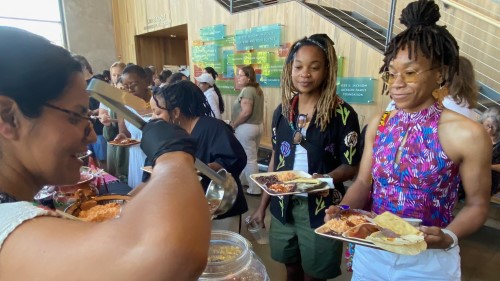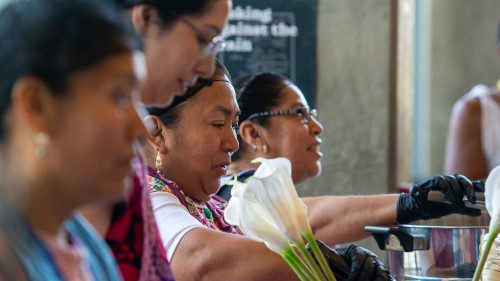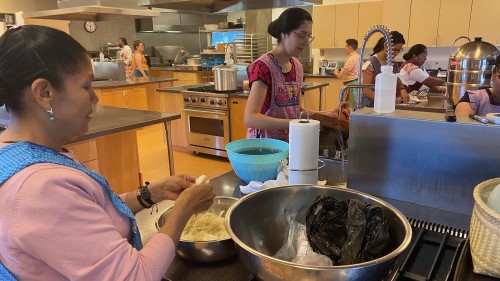
Nu’u Yavi women from Madera serve lunch. Eduardo Stanley
On May 30-31, PVI staff members Myrna Martinez Nateras, Estela Galvan, and Joshua Slack had the privilege of attending the last of three colloquia for the Thinking Food Initiative at UC Davis.
This year-long initiative unearths the systemic roots of food inequity through humanities-based programs that bridge cultural histories, current realities, and public imagination. It was a wonderful gathering that encouraged us to think about and experience food through all our senses.
On the first day, we participated in the Black Food Futurism workshop led by Nia Lee, which examined the future of food through an afrofuturistic lens and guided us on a journey of meditation and intention regarding our consumption.
After the lunch provided by Meza, a fusion of Arab-Mexican food, all of the participants engaged in story circles. The story circles focused on food futures as we shared our experiences with food and the food future we would like to see. It was particularly enjoyable to listen to others share how they relate to food and what they hope for in the future. As someone mentioned during the session, it’s about imagining the kind of future we want when it comes to food justice and nourishing practices for all communities.
To close out the first day, the keynote speaker, Professor Julie Guthman, spoke profoundly about Silicon Valley’s lack of understanding regarding the future of food. After the first day, we were inspired and more than excited for the next day, which did not disappoint.
The second day began with a keynote speech by Calrton Turner. He told us his story of growing up in Mississippi and the culture of food, family and freedom. This informs the work that he steps into every day at Sipp Culture, an organization that he and his wife, Brandi, founded in Utica, Mississippi.
After the excellent keynote speech, we broke off into workshops. I (Joshua) decided to participate in the workshop on Building Sustainable Wheat for Local Food Systems. This introduced me to the concept of food breeding and the work that some of the agricultural students at UC Davis have contributed in the past decade.

Nu’u Yavi women’s group shares their love of food, culture and community. Eduardo Stanley
Shortly after the first workshop, we had lunch provided by the Nu’u Yavi women from Madera. PVI convened the Nu’u Yavi women’s group through our economic justice initiative. PVI has enabled these women to launch their collective income generation and food justice work for a year.
We anticipated a treat, but it was incredibly inspiring and beautiful to hear the Nu’u Yavi women speak about their journey and the effort they've invested out of love for their culture and community. No one left lunch feeling anything but emotional.
In fact, the Nu’u Yavi Cultural Kitchen was one of the event’s most significant highlights. Supporting the women as they shared their stories and prepared meals was incredibly moving. You could see how proud they were to offer their culinary knowledge and experience—it was a beautiful and powerful moment.
After lunch, it was time for the 2nd round of workshops. I (Joshua) participated in the “Sweet Without the Sting” workshop, where we learned about the stingless bees that reside in Colombia and were fortunate enough to taste the various forms of honey they produce.
After the reflection hour, during which we wrote down our feelings and feedback about our experience, we concluded the weekend with a closing roundtable. Each speaker, workshop leader, and event organizer had the opportunity to participate in a roundtable discussion Q&A and ask questions of one another. Immediately following that, we wrapped up the event with a reception.
As you can imagine, we left feeling incredibly full—not just from the food we ate, but because the entire experience filled us with gratitude, communal love, and a deeper understanding of various cultures and practices. Thinking Food was an experience I (Joshua) will cherish and apply to my lifelong work.
I (Estela) found it thought-provoking how the artists, keynote speakers, and workshops emphasized the need to reconsider our relationship with food. It reminded me of the significance of sharing our own stories and honoring those who came before us — how they brought us joy and comfort through food. That legacy is something I believe should be passed down to future generations.

Nu’u Yavi women prepare lunch. Eduardo Stanley